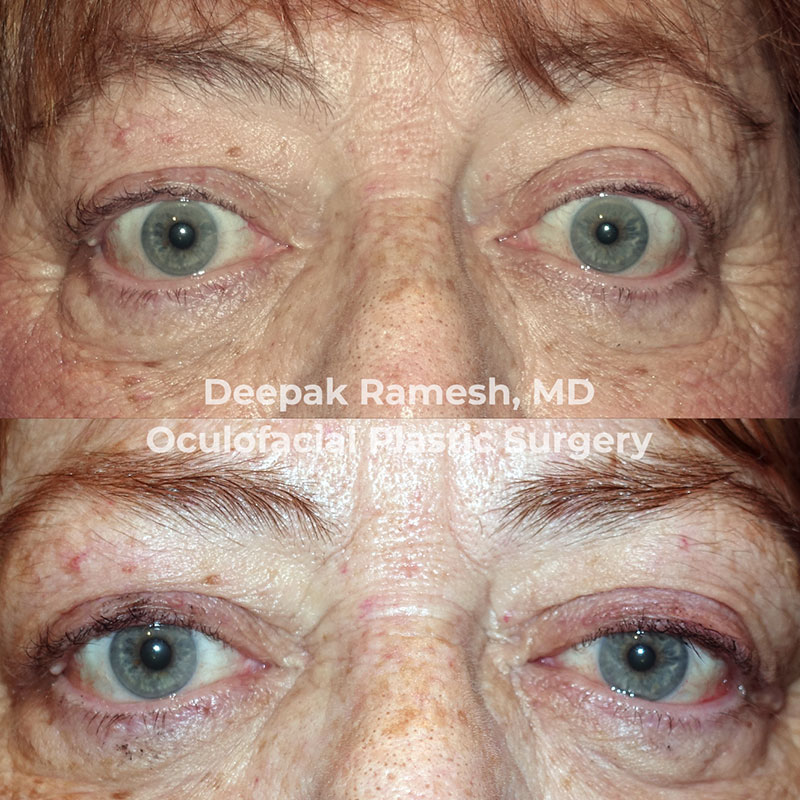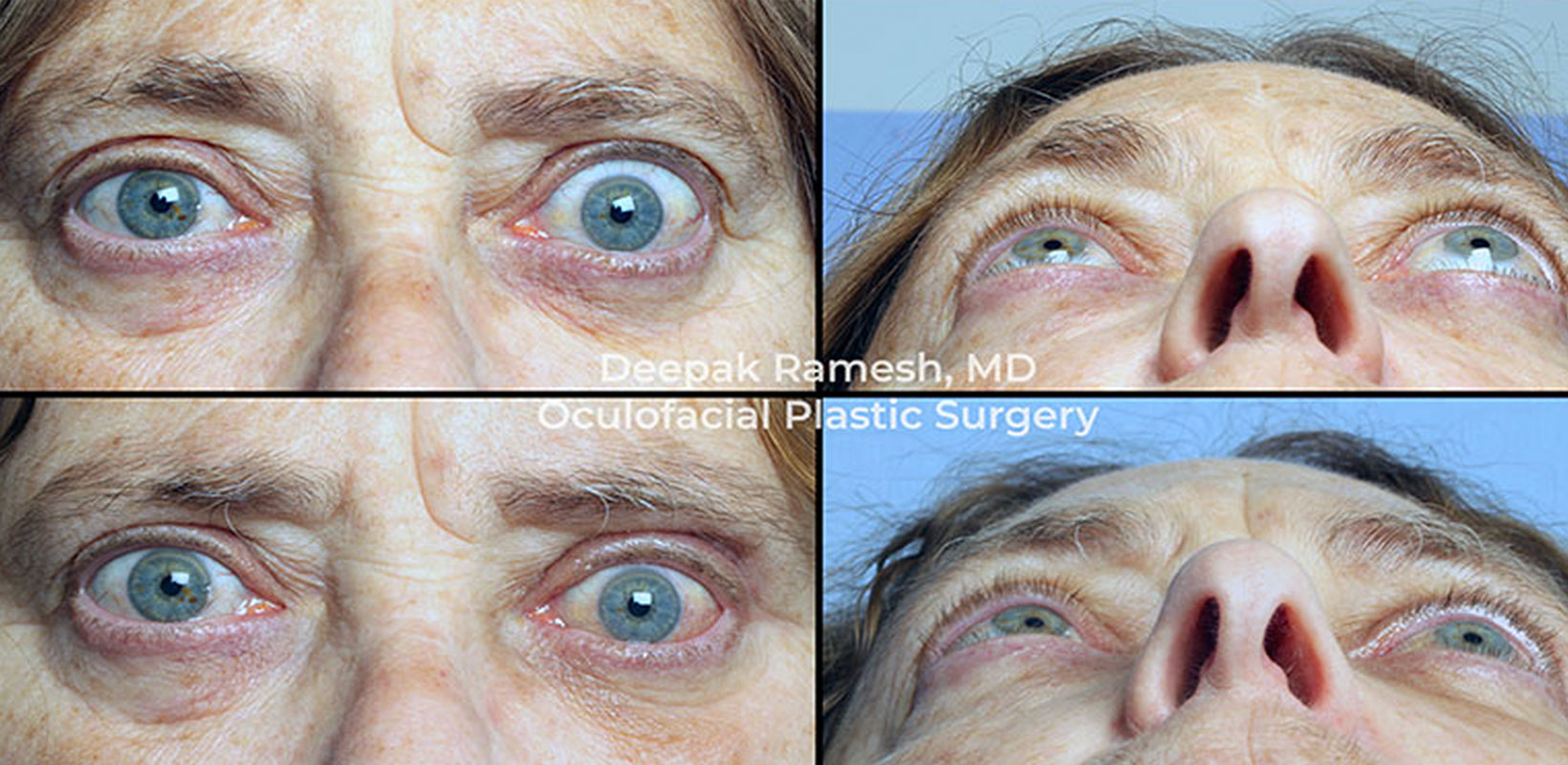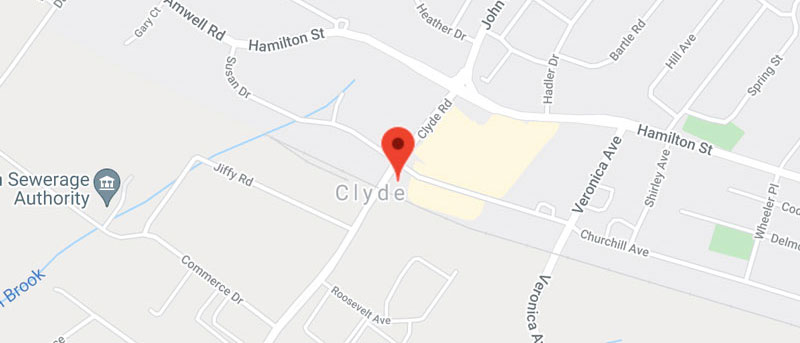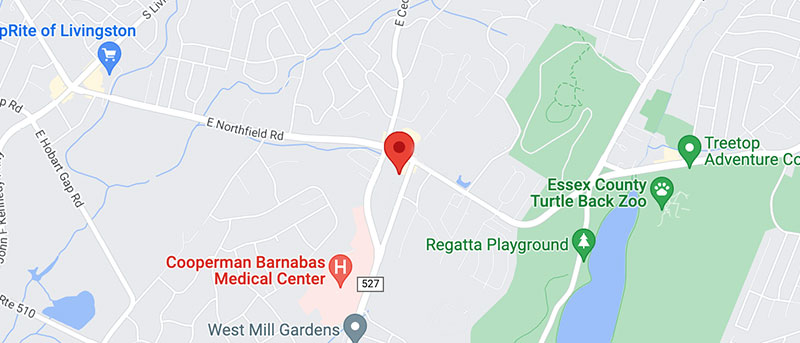Thyroid disease can be life-altering when it affects the eyes, as it typically becomes active at the age when patients are getting married, advancing in their careers, and planning their life goals. Thyroid eye disease in New Jersey can be disfiguring and debilitating and the condition needs close follow-up and expert treatment by an experienced orbital specialist to ensure an optimal outcome. Our goal is to help you achieve the function and cosmetic appearance you had before the onset of the disease.
Subscribe to receive Dr. Ramesh's FREE eBook on Thyroid Eye Disease
Learn about the molecular basis, diagnosis, symptoms, and latest treatments for the disease.
Thyroid Eye Disease

What is thyroid eye disease (TED)?
Thyroid eye disease (TED), also known as Graves’ orbitopathy or Graves’ eye disease, is an autoimmune condition where the body’s immune system attacks the tissues around the eyes. This can lead to inflammation and a buildup of tissue and fat behind the eye, causing the eye to be pushed forward. The disease can affect the eye muscles, soft tissue, and eyelids, leading to symptoms like bulging eyes, double vision, dry eyes, pain behind the eyes, and swelling around the eyelids. In severe cases, it can also cause vision loss.
How do I know if I have thyroid eye disease?
Thyroid eye disease in New Jersey can present even before thyroid abnormalities show in your bloodwork. It can affect eye muscles, soft tissue, or eyelids most commonly. Typical symptoms include bulging eyes, double vision, dry eyes, pain behind the eyes, swelling and puffiness around the eyelids and eyebrows, and, in extreme cases, vision loss.
If you have any of these symptoms, you should be evaluated promptly to determine if thyroid eye disease is the cause of your condition. A thorough history and clinical examination, along with bloodwork or a CT scan, is helpful in making the diagnosis. Most patients develop TED within 12 months of diagnosis of their systemic thyroid illness.
What is orbital decompression?
Orbital decompression is a surgery for patients with naturally prominent or bulging eyes. This can improve the aesthetic appearance of the eyes and any symptoms of dryness, light sensitivity, or tearing. Dr. Ramesh is a world expert in this challenging surgery and has published multiple scientific articles and book chapters on the subject. Most importantly, he has a passion for taking care of patients with thyroid eye disease and providing relief from their medical and cosmetic symptoms.
Health insurance typically covers the majority of the rehabilitative treatments associated with thyroid eye disease in New Jersey. Please schedule a consultation so that we can check what your insurance will cover.
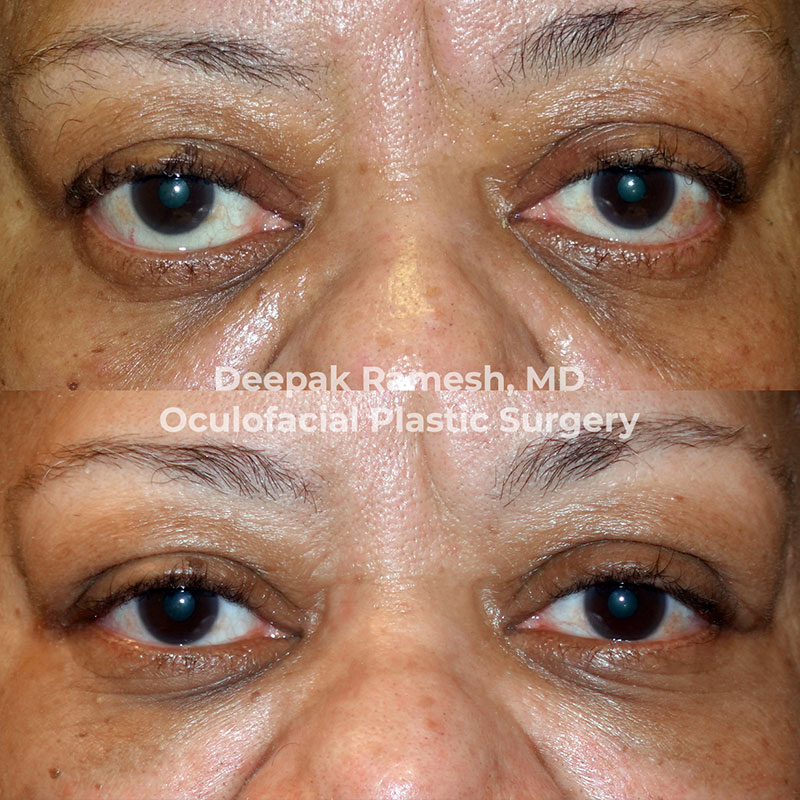
What are the available treatments?
Different aspects of thyroid eye disease require different solutions. In the initial active or inflammatory phase, medicines, specialized prismatic glasses, and injections can be helpful. Dr. Ramesh was involved in the testing and development of next-generation immunotherapy (Tepezza) to treat particularly difficult cases of thyroid eye disease. After the disease has stabilized, surgery to reduce double vision, reduce bulging of the eyes, or restore the cosmetic appearance to what it was before the onset of the disease can be considered.
Surgery must be customized to your condition, and there is no “one-size-fits-all” approach. We will carefully listen to your concerns, and together, you will design a plan to address your particular problems. We also encourage you to bring old photos, to understand your facial structure before the thyroid eye disease started.

What can I expect afterward?
Surgery for thyroid eye disease in New Jersey may be performed under general or twilight anesthesia. Following surgery, patients can expect bruising and swelling around the eyes for 1-2 weeks. While these symptoms can be uncomfortable, they are typically managed with minimal pain. Most patients are ready to return to formal social functions within six weeks post-surgery. Our goal is to help you regain the appearance and function you had before thyroid eye disease.
Please follow these aftercare guidelines to ensure optimal results and recovery:
- Rest as much as possible in the first few days post-surgery.
- Keep your head elevated, even while sleeping, to reduce swelling.
- Apply ice packs to the surgical area for the first 48 hours to minimize swelling and bruising.
- Take all prescribed medications, including antibiotics and pain relievers, as directed.
- Avoid non-steroidal anti-inflammatory drugs (NSAIDs) unless approved by your surgeon.
- Avoid strenuous activities, heavy lifting, and bending over for at least two weeks.
- Use lubricating eye drops as recommended to prevent dryness and discomfort.
- Avoid rubbing or touching your eyes.
- Attend all scheduled follow-ups to monitor your recovery and address any concerns.
- Wear sunglasses to protect your eyes from sunlight and wind when outdoors.
- Maintain a healthy diet and stay well-hydrated to support your body’s healing process.
For further information on available options, book a consultation to explore potential treatments for thyroid eye disease in New Jersey.
Thyroid Eye Disease FAQs
What are the common symptoms of thyroid eye disease?
Common symptoms include bulging eyes, double vision, dry eyes, pain behind the eyes, swelling and puffiness around the eyelids and eyebrows, and, in extreme cases, vision loss.
How is thyroid eye disease diagnosed?
Diagnosis involves a thorough history and clinical examination, blood tests to check thyroid function, and imaging tests such as a CT scan to assess the extent of tissue buildup.
Can thyroid eye disease cause permanent vision loss?
While rare, severe cases of thyroid eye disease can lead to permanent vision loss if not treated promptly. Early diagnosis and treatment are crucial in preventing this outcome.
How long does thyroid eye disease typically last?
The duration of thyroid eye disease in New Jersey varies. The active or inflammatory phase usually lasts 6 months to 2 years, after which the disease often stabilizes. However, the duration can be longer in some cases, requiring ongoing management.
Are there any lifestyle changes that can help manage thyroid eye disease symptoms?
Yes, certain lifestyle changes can help manage symptoms. These include quitting smoking, as smoking can worsen TED, maintaining a healthy diet, managing stress, and using lubricating eye drops to alleviate dryness.
Contact Us
Schedule an
Appointment
BOOK NOW
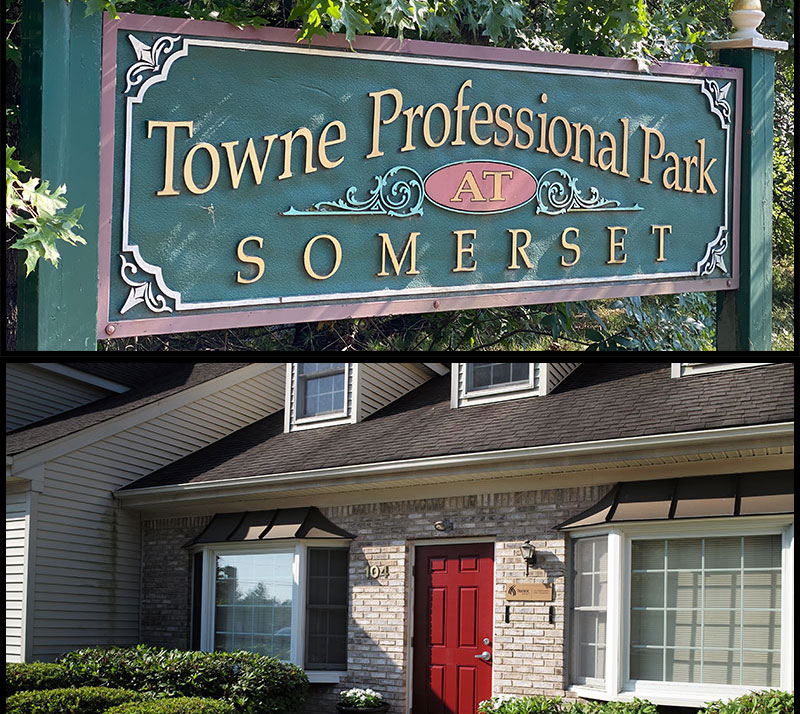
The Center for Eye and Facial Plastic Surgery
35 Clyde Road, #104
Somerset, NJ 08873
Monday – Friday: 8:30a – 4:30p
Livingston Office
22 Old Short Hills Rd Suite 202
Livingston, NJ 07039
Monday: 9:00a – 5:00p
Tuesday: 12:00p – 7:00p
Wednesday – Friday: 9:00a – 5:00p
P: (609) 608-0142
F: (855) 644-0469

